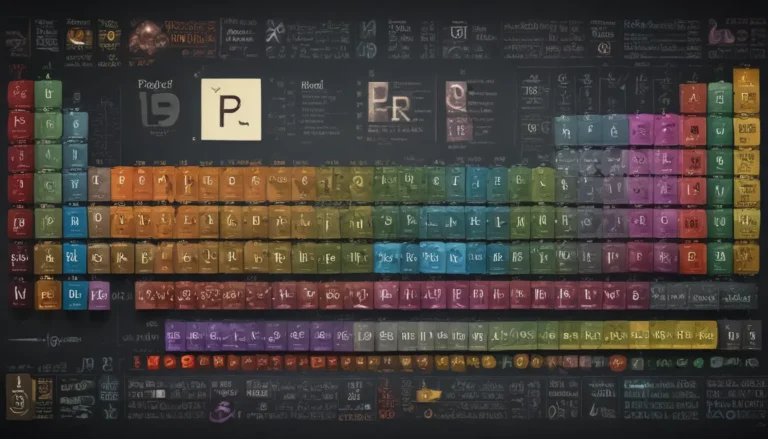A Note About Images: The images used in our articles are for illustration purposes only and may not exactly match the content. They are meant to engage readers, but the text should be relied upon for accurate information.
Electrons, the unsung heroes of the atomic world, quietly power our technological advancements and drive essential processes in chemistry and physics. From the inner workings of electronic devices to the intricate details of chemical bonding, electrons play a pivotal role in shaping the world as we know it. In this article, we will take an electrifying journey through 18 fascinating facts about electrons, shedding light on their discovery, behavior, and mind-boggling properties. Get ready to uncover the electrifying secrets of these tiny yet mighty particles as we explore the captivating world of electrons.
The Fundamental Nature of Electrons
Electrons, as tiny subatomic particles, are classified as leptons, a type of fundamental particle that does not experience the strong nuclear force. They are essential components of atoms, carrying a negative electric charge and playing a crucial role in various phenomena in the realms of physics and chemistry.
Discovery of Electrons by J.J. Thomson
The year 1897 marked a significant milestone in scientific history when J.J. Thomson discovered electrons during experiments with cathode rays. Observing particles with a negative charge and a much smaller mass than that of an atom, Thomson’s groundbreaking discovery revolutionized the understanding of atomic structure and laid the foundation for modern physics.
Wave-Particle Duality of Electrons
According to quantum mechanics, electrons exhibit wave-particle duality, displaying both wave-like and particle-like behaviors. This phenomenon challenges classical physics and highlights the unique nature of electrons, adding a fascinating dimension to their characteristics.
Electrons in Electricity
The flow of electrons forms the basis of electric current, a fundamental aspect of electricity. This flow of charge powers a wide range of electrical devices and underpins numerous technological advancements that have transformed our world.
Contribution of Electrons to Chemical Bonding
In chemical reactions, electrons are exchanged, shared, or transferred between atoms, leading to the formation of chemical bonds. This process governs the properties and interactions of substances, shaping the world of chemistry as we know it.
Energy Levels of Electrons in Atoms
Within an atom, electrons occupy specific energy levels or orbitals, influencing an element’s chemical properties and reactivity. The arrangement of these electrons offers valuable insights into the behavior of matter at the atomic level.
Role of Electrons in Electronics
The manipulation and control of electron flow are essential for the functioning of electronic devices such as computers, smartphones, and televisions. This pivotal role underscores the significance of electrons in powering modern technology.
Generation of Light by Electrons
When electrons transition between energy levels in an atom, they emit photons, resulting in the production of light. This process forms the basis of various lighting technologies and optical phenomena that have transformed our daily lives.
Quantum Tunneling Phenomenon of Electrons
In quantum mechanics, electrons can overcome energy barriers by tunneling through them, a phenomenon with implications in electronics, microscopy, and other scientific applications. This fascinating behavior highlights the unique capabilities of electrons at the quantum level.
Contribution of Electrons to Magnetism
The spin and orbital motion of electrons give rise to magnetic properties in materials, influencing the behavior of magnets and contributing to a wide array of technological developments. Electrons play a crucial role in the manifestation of magnetism in various materials.
Role of Electrons in Photosynthesis
In photosynthetic organisms, electrons are key participants in the conversion of light energy into chemical energy, enabling the synthesis of organic compounds crucial for sustaining life. Electrons’ involvement in this process highlights their importance in the biological realm.
Electronic Band Structure and Electrons
The arrangement of energy bands in materials, influenced by electron behavior, underpins the properties of semiconductors and conductors, shaping the landscape of modern electronics. Electrons play a vital role in determining the electronic properties of materials used in electronic devices.
Utilization of Electrons in Electron Microscopy
Electron microscopes leverage the wave nature of electrons to achieve high-resolution imaging, enabling the visualization of intricate details in diverse samples. Electrons’ unique properties make them invaluable for advancing scientific research and discovery.
Functionality of Solar Cells Powered by Electrons
In photovoltaic devices such as solar cells, electrons are set into motion by incident light, generating an electric current that powers various applications, including solar panels and renewable energy systems. Electrons play a crucial role in harnessing solar energy for sustainable power generation.
Role of Electrons in Quantum Computing
The manipulation and entanglement of electrons are foundational elements in the development of quantum computing, a revolutionary paradigm with the potential to redefine computational capabilities. Electrons play a key role in driving advancements in the field of quantum information processing.
Pauli Exclusion Principle and Electrons
The Pauli exclusion principle dictates that no two electrons within an atom can possess the same set of quantum numbers, influencing electron configurations and the behavior of matter at the atomic scale. This fundamental principle shapes our understanding of electron behavior and interactions in atoms.
Contribution of Electrons to Solid-State Physics
The behavior of electrons in crystalline solids forms the basis of solid-state physics, driving advancements in materials science, electronics, and semiconductor technologies. Electrons’ properties play a central role in shaping the properties of materials used in modern technology.
Electrons in the Study of the Universe
The study of electrons extends beyond Earth, contributing to the exploration of celestial bodies, the understanding of cosmic phenomena, and the unraveling of the universe’s mysteries. Electrons play a crucial role in advancing our knowledge of the broader universe and its intricacies.
Conclusion
In conclusion, electrons are remarkable subatomic particles that significantly impact the functioning of our universe. Their unique properties and behaviors have captivated scientists and enthusiasts for decades, leading to groundbreaking discoveries in various scientific disciplines. Understanding the role of electrons is essential for advancing our knowledge of physics, chemistry, and technology, unlocking new possibilities for innovation and exploration.
Explore Further: Electron Shells, Clouds, and Configuration Notation
Delving deeper into the world of electrons reveals intriguing aspects of electron shells, clouds, and configuration notation. Exploring these concepts provides a more comprehensive understanding of electrons’ roles in atoms and molecules, offering valuable insights into the subatomic realm and expanding our knowledge of electron behavior and interactions.
Trustworthy Content:
Our commitment to delivering trustworthy and engaging content is paramount. Each fact shared on our platform is contributed by real users like you, ensuring a wealth of diverse insights and information. Our dedicated editors rigorously review each submission to ensure the highest standards of accuracy and reliability. Trust in our commitment to quality and authenticity as you explore and learn with us.
By delving into the world of electrons, we gain a deeper appreciation for the intricate workings of the atomic realm and the essential role these tiny particles play in shaping the world as we know it.From powering technology to enabling chemical reactions, electrons have left an indelible mark on science and technology, inspiring continuous exploration and innovation. As we continue to uncover the mysteries of electrons, we unlock new possibilities for scientific advancements and technological breakthroughs.






